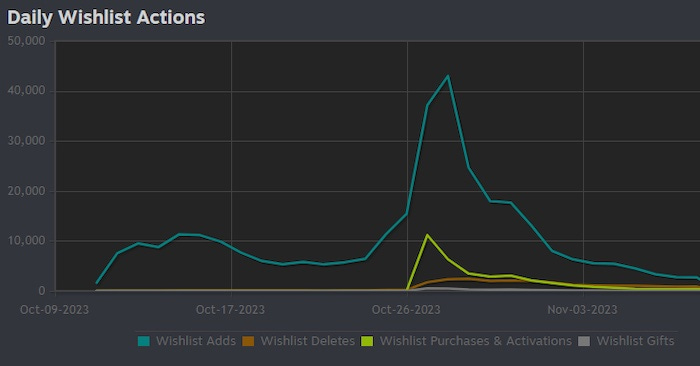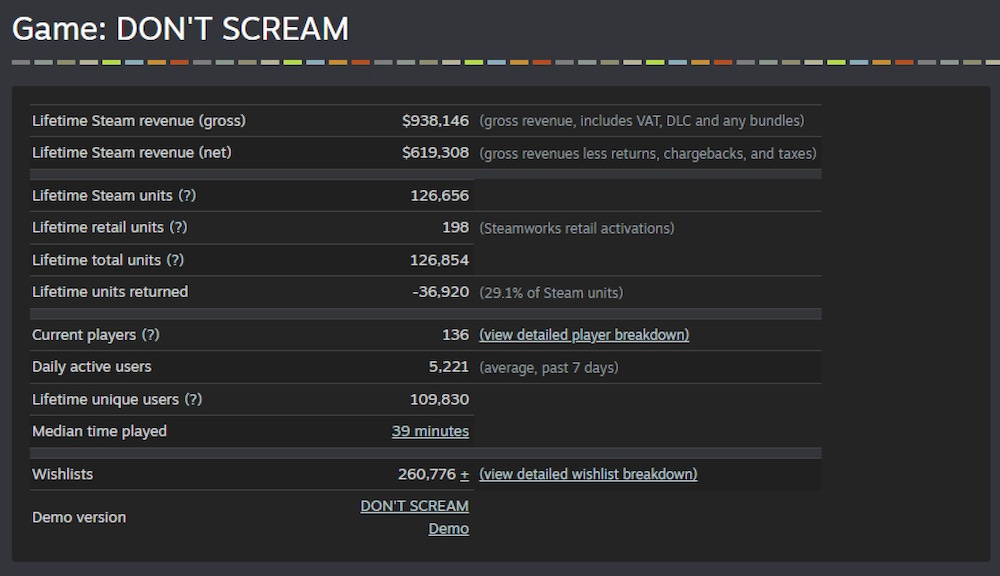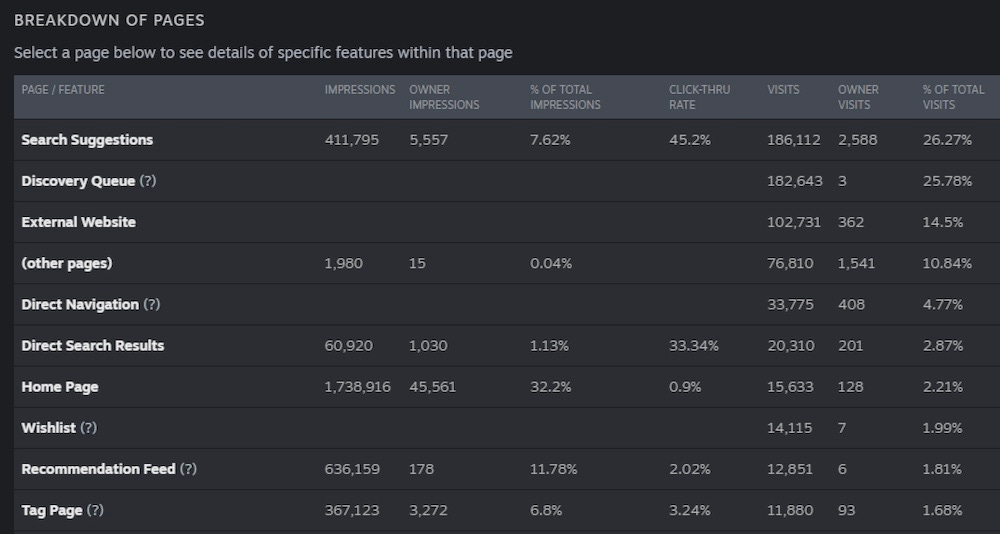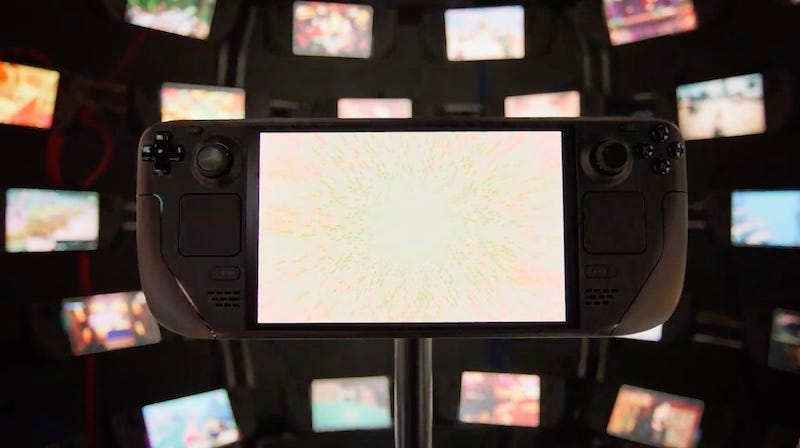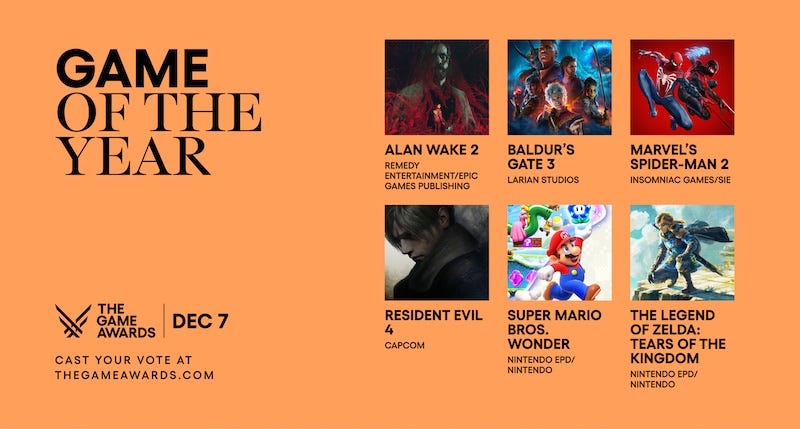Don't Scream: jumpscaring a giant 'hook' to >100k sales in 2 weeks!
Publikováno: 13.11.2023
Also: new PlayStation & Steam Deck goodness, and lots more news.
[The GameDiscoverCo game discovery newsletter is written by ‘how people find your game’ expert & company founder Simon Carless, and is a regular look at how people discover and buy video games in the 2020s.]
And we’re back in the room. Hope everyone had a fine weekend, and we have two jampacked newsletters to get through in the first half of this week. So let’s get to it, shall we? And we’re starting with.. another horror game!
To set the scene - who knows about movie director William Castle? He was famed for his movie theater ‘gimmicks’ in the 1950s and 60s, from “a skeleton… attached to wire floating over the audience” (House On Haunted Hill) to “military surplus airplane wing de-icers (consisting of vibrating motors)… attached to the undersides of seats” (The Tingler).
In The Tingler, when the device was activated in-theater, Vincent Price tells the audience to ‘scream for your lives!’, since The Tingler “is a creature that attaches itself to the human spinal cord. It is activated by fright and can be destroyed only by screaming.” And a worthy video game successor to William Castle’s shenanigans? That’s Don’t Scream!
[REMINDER: you can support GameDiscoverCo by subscribing to GDCo Plus now. You get full access to a super-detailed Steam data cache for unreleased & released games, weekly PC/console sales research, Discord access, six detailed game discovery eBooks - & lots more. ]
Don’t Scream: ‘if you scream, you lose’ - but discovery wins!
We talk a lot about ‘hook’ in games. And two-person development effort Don’t Scream is co-created by marketing supremo Joe Henson, who is also a key player in first-person ‘bodycam’ UE5 title Paranormal Tales, which we profiled about a year ago, when it got 70,000 wishlists in its first week.
Paranormal Tales is a more complex, deeper game which now has a co-development deal with another dev team. So in the meantime, lead dev Joure and Joe “wanted to offer something unique and playable for you by this Halloween” - hence the creation & launch of Don’t Scream, which was just a “5-month project… [with] 2 weeks of pre-launch marketing”, but hit 130,000 Steam wishlists (from 0!) in those two weeks.
We’ll just add the full Steam capsule description for the game, which released on October 27th, because it’s a great ‘explainer’: “An Unreal Engine 5 short horror experience made by two indie devs. The challenge: explore the forest for 18 minutes without screaming. The catch? Time only ticks when you move… MICROPHONE REQUIRED!”
Of course, this title is partly procedural to avoid the same scares in the same order. But the underlying idea - ‘you scream, you die!’ is incredibly appealing to players. And, as importantly, it makes for great content for streamers, from Markiplier to Pokimane & beyond.
How potent is the game ‘hook’ on Don’t Scream? Well, Joe told us it actually went viral in Japan before he even formally announced it: “When the Steam page went live, i made sure to get it professionally translated into Japanese”, partly to time with Halloween, and this Tweet - with 8.1 million views - is just the tip of the iceberg for interest there.
The results? Joe was kind enough to share a lot of the underlying Steam data with us. Remember, this is a ‘zero marketing budget’ launch, with a ton of organic interest:
Firstly, here (above) is both the wishlists and ‘purchases from wishlists’ for the lifetime of Don’t Scream so far. Talk about a standing start - the title very swiftly got >10,000 daily wishlists after its announcement, and rarely less than 5k per day before release!
BTW, a lot of this pre-launch interest was down to things like massive influencers like xQc playing the good-looking trailer live for a ‘reaction’ and getting jumpscared by it. Turns out horror game trailers can get a lot of organic reach that way? As for results:
Not bad, huh? With 126k copies sold, actually really good. The game only has around 970 max CCU on Steam, but that’s because it’s a short title (it’s $10, and has a 39 minute median playtime.) So it sold way better than you might expect, given the CCU.
The one ‘blot on its copybook’ is its refund rate, which is one of the highest we’ve seen for a popular Steam game, at 29.1% (by units.) So we’re in the odd situation where the game has made $940,000 gross, but $433,000 net (what Steam pays out, before company/personal income taxes), a 46% gross to net ratio. (It’s normally more like 58%.)
Of course, the $ are still great. But why so many refunds? Most likely it’s simple: the game isn’t trying for gameplay longevity, it’s intentionally ‘short x jumpscares’, right? (Although we’ve looked at this before, and refunds are less common for shorter titles with a niche audience. This one’s an exception due to its broad, casual player base!)
Anyhow, the breakdown of countries for the game is also interesting, with the U.S. predictably doing well, and Germany and Japan also high up the list:
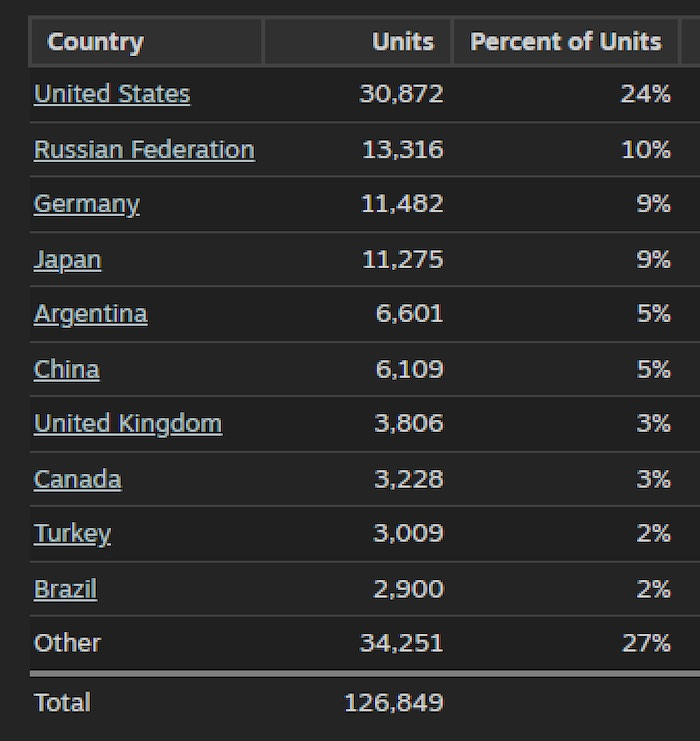
We also chatted to Joe more about making Don’t Scream, which he has a Twitter/X thread explaining, too. His view? “I aimed to demonstrate that marketing shouldn't be an afterthought. Rather, game design and marketing can be seamlessly integrated and function effectively as one unit, if managed properly.”
Our view? Hook-first games can work, and there’s plenty of satisfied customers, per Steam reviews: “Put the sound to the max and isolate yourself, dark room / night, no background noise and you will jump more than once.” (There are also reviews complaining that the gameplay becomes predictable too quickly, of course.)
Oh, and a bonus back-end view that we rarely show? This is the traffic to Don’t Scream’s page on Steam for last week, starting a few days after the game released:
What’s interesting here is both:
The massive Search Suggestions traffic, indicating a lot of people are coming to Steam, starting to search for the game name & then clicking it in the search bar.
The sheer amount of Steam Discovery Queue traffic, which is 26% of total visits. Breakout game means more DQ recommendations - that’s why it’s so important.
So yep, we’re a little fascinated by this case study. We’re not denying the underlying idea of Don’t Scream is gimmicky. (Maybe not ‘floating a plastic skeleton over the audience in a movie theater’ level gimmicky, but nonetheless!)
But its execution is good (for a small idea!), horror is an amazingly reach-friendly subgenre, and the organic reach was sublime. We’ve seen alternative control or interaction methods go viral before - the webcam-centric Before Your Eyes went viral on TikTok back in 2021. Here’s your hot new example…
Sony backs off on live game launches, PS5 grows

Since we last put out a free newsletter, Sony’s latest quarterly results [.PDF] debuted, and look (above), the PlayStation 5 is close to catching the PS4 in terms of comprative hardware shipments - after COVID-era component shortages mangled things.
That’s not the only interesting thing going on, though. So let’s recap for a second:
PlayStation shipped 4.9 million PS5s, and saw record revenue:as VGC shows, this was partly helped by big yen/dollar exchange rate wins, but also by hardware sales - and third-party game revenues - going up, year on year. (Profitability is a bit depressed compared to previous fiscal years, due to FX/cost of hardware.)
Sony isn’t planning to overdiscount to sell PS5 hardware:per Bloomberg, Sony COO Hiroki Totoki said: “We recognize selling more than 25 million PS5 units this fiscal year remains a challenging goal… we won’t pursue expanding the PS5 installment base alone, but will keep profitability in mind.” (In other words: no 50% off sales - but maybe some 20% off ones?)
PlayStation Network users bumped up slightly, as digital sales % grew: per VGC: “PlayStation Network monthly active users (MAU) were up five million year-over-year to 107 million… Digital software accounted for 67% of quarterly game sales, compared to 63% last year.”
But the big news about Sony’s ‘live service’ games push - made by Totoki in Q&A comments - is that “the company now plans to have just six online multiplayer games released by the end of Sony’s 2025 fiscal year, which will end on March 31, 2026.” This compares to the 12 being confidently trumpeted a few months ago.
According to Totoki: “Sony still has 12 live-service titles planned, but that the company is currently reviewing them in order ‘to meet gamers’ expectations’ and to ensure that those games ‘will be played and liked for a long time.’”
GameDiscoverCo readers may recall we ran something on Sony’s GaaS push last month, saying: “as logical as it is from a pure business perspective, saying you are going to have hit GaaS titles in today’s crazy busy market - before having them - is a potential recipe for problems.”
And it seems like Sony is realizing that too. We’ll be fascinated to see how SIE’s new CEO - whoever that turns out to be - plays the GaaS card, after PlayStation head Jim Ryan departs in early 2024. (Totoki himself is currently scheduled to be interim CEO at that point - but presumably somebody else will be hired swiftly.)
Steam Deck OLED - where did that come from?
Well, it came from Valve, obviously, but we were not expecting the Steam Deck ‘portable game device’ to roll out an upgraded OLED version late last week. It’s basically a refinement of the original design, not a performance upgrade. But it deserves a dedicated newsletter section!
It’s got some real good features - including a 7.4 inch HDR OLED display, 30-50% more battery life (thanks to a more efficient display & AMD APU and bigger battery!), it runs cooler due to “a bigger fan and updated thermals”, and even weighs ~5% lighter than the LCD model.
The new Steam Deck costs $549 USD with 512GB of storage and $649 for 1TB. So sure, it’s expensive even compared to Nintendo Switch OLED (normally $350), but compares well to the higher-end OG Steam Deck pricing. (The $399 256GB LCD version is staying as a low-end option.)
(BTW, Valve confirmed it had sold “multiple millions” of the Steam Deck to date. Hey, GameDiscoverCo’s 3-4 million guesstimate is also ‘multiple millions’, we must be right!)
For more, we recommend checking out The Verge’s review, which is comprehensive and helpful, suggesting of the OLED screen: “it’s like getting a new pair of headphones and wanting to hear all your favorite songs again”, giving a thumbs-up to all the iterative improvements, and concluding: “So I’m pretty sure I’ll buy a Steam Deck OLED - unless I can convince myself to wait for the Deck’s eventual next-gen successor.”
Valve has been transparent that a Steam Deck 2 is multiple years away. So in the meantime, please play all your existing Steam titles on Steam Deck via the super-clever SteamOS Linux flavor, and entertain yourself with this ‘orb of Steam Deck OLEDs’ that Valve built somewhere inside its HQ for its announce video. (Physical effects FTW!)
The game discovery news round-up.
Wow, that was a lot of stuff. But before we’re done, here’s some more stuff, of the game platform/discovery variety:
The Game Awards has put out its full list of nominations for the December 7th event in LA, and Alan Wake 2 and Baldur’s Gate 3 lead nominations with eight each, including Game Of The Year. (Other GOTY noms? Spider-Man 2, Resident Evil 4, Super Mario Bros. Wonder and Zelda: Tears of the Kingdom.)
In its speculation about a ‘hot Black Friday’ for consoles, GI.biz has some great new data showing PlayStation 5’s ascent, according to GfK: “In the UK, PS5 had a 43% share of all console sales over the last 12 months (November 2022 to October 2023), but over the last six months (May 2023 to October 2023) that has risen to 51%.” (Xbox is down from 26% to 23%, and Switch from 34% to 25%!)
Amazon is laying off 180 people & closing its Crown Channel and Game Growth divisons, as Amazon Games VP Christoph Hartmann said in an internal note: “We’ve listened to our customers and we know delivering free games every month is what they want most, so we are refining our Prime [Gaming] benefit to increase our focus there.”
Live service games - are they on or off the menu? On the one hand, Warner Bros Games is trumpeting: “Our focus is on transforming our biggest franchises from largely console and PC based, with three-four year release schedules to include more ‘always on’ gameplay through live services, multiplatform and free-to-play extensions.”
On the other hand, Remedy’s ‘Vanguard’ codename project with Tencent is being rebooted: “Due to uncertainties in creating a successful game to the rapidly changing free-to-play market and associated risks”, the formerly co-op F2P multiplayer project is now “a premium game with a strong, cooperative multiplayer component.”
Are players reselling in-game items a good idea for your game? NFTs have rather tarnished the idea, but Liquid And Grit took a closer look at Steam’s Community Market & Roblox, suggesting: “Web2 games can already implement successful marketplaces that are more lucrative, easier to use for players, and easier to balance for developers than anything that’s come out of Web3 so far.”
Netflix has revealed more of its ‘mobile first, Netflix logon to play’ titles coming in 2024, including Supergiant’s megahit Hades, as well as Braid: Anniversary Edition, and games based on Netflix TV/movie IP including Chicken Run: Eggstraction, Shadow and Bone: Enter the Fold, and The Dragon Prince: Xadia.
Xbox things: Turn 10 (Forza)’s Alan Hartman is the new head of Xbox Game Studios, with Hartman and Zenimax/Bethesda’s Jamie Leder reporting to ‘president of game content and studios’ Matt Booty; Microsoft says it's “turning to AI tools to help ‘accelerate’ its Xbox moderation efforts, letting these systems automatically flag content for human review without needing a player report.”
RoadToVR is pointing to a Wall Street Journal report that Meta & Tencent have reached a deal to sell “a new, lower-priced version of its VR headset” in China. Allegedly: “Tencent will start selling the headset beginning in late 2024, with the two companies reaching a deal after about a year of negotiations.”
A couple of clarifications & corrections from last Wednesday’s newsletter: firstly, Hades was still a standout ‘Early Access to 1.0’ release, but there was a review spike in Nov/Dec. 2020 due to Steam Award nominations, making the ‘win’ look outsized! (And secondly, Super Nintendo World, which is about to ‘do the Donkey Kong’, is in Osaka, not Tokyo. Woops.)
Finally, listening to a 2 hour ‘yacht rock’ music mix, we discovered this Michael Franks LP track from 1983 - the height of the U.S. arcade game craze. Yes, the lyrics start: “You used to be her space invader, Snatching her free from King Kong's choke, She's allons-y, She'll catch you later, Now that your joystick's broke.” Wow. Plz enjoy:
[We’re GameDiscoverCo, an agency based around one simple issue: how do players find, buy and enjoy your PC or console game? We run the newsletter you’re reading, and provide consulting services for publishers, funds, and other smart game industry folks.]
